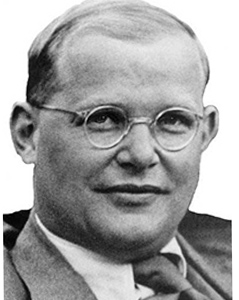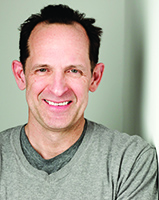Second Annual Lecture and Community Conversation on Race and Church
I n the fall of 1930, Dietrich Bonhoeffer left Berlin and traveled to New York City as a postgraduate fellow at Union Theological Seminary, at the time the flagship seminary of mainline Protestantism in America. When he arrived in Manhattan he was a straight-arrow academic whose star was rising, a 24 year old assistant professor at the University of Berlin whose doctoral dissertation would be praised by the great Karl Barth as a "theological miracle". His sights were set on a lifetime of academic accomplishments and the lush rewards of the guild. But when Bonhoeffer left America 10 months later, he left with a dramatically transformed perspective on social engagement, faith, and historical responsibility. He began to put aside his professional ambitions and to look for resources in the Christian (and increasingly in the Jewish) tradition that might inspire and sustain dissent and civil courage. By the end of April 1933, Bonhoeffer made his first public defense of the Jews and condemnation of the Aryan Clause.
n the fall of 1930, Dietrich Bonhoeffer left Berlin and traveled to New York City as a postgraduate fellow at Union Theological Seminary, at the time the flagship seminary of mainline Protestantism in America. When he arrived in Manhattan he was a straight-arrow academic whose star was rising, a 24 year old assistant professor at the University of Berlin whose doctoral dissertation would be praised by the great Karl Barth as a "theological miracle". His sights were set on a lifetime of academic accomplishments and the lush rewards of the guild. But when Bonhoeffer left America 10 months later, he left with a dramatically transformed perspective on social engagement, faith, and historical responsibility. He began to put aside his professional ambitions and to look for resources in the Christian (and increasingly in the Jewish) tradition that might inspire and sustain dissent and civil courage. By the end of April 1933, Bonhoeffer made his first public defense of the Jews and condemnation of the Aryan Clause.
What happened in America? In the America of the 1930s, among a nearly forgotten but venerable generation of religious radicals, social gospel reformers, and African American prophets, among the shapers of the labor movement, the heroes of the old reformist Left, and among the women and men who plowed the soil for the civil rights movement to come, Bonhoeffer reexamined every aspect of his vocation as pastor and theologian, and he embarked upon what he would call "the turning from the phraseological to the real". Bonhoeffer awakened to fresh spiritual energies in what he called "the church of the outcasts of America".
Date and Time
Sat., Jan. 16, 2016, 2:00-8:30 p.m.
2:00 p.m. "Dietrich Bonhoeffer's Journey to Reality" with Charles Marsh, Hicks Chapel Auditorium
3:10 p.m. Break and Refreshments, Long Hall
3:30 p.m. Breakout Discussions on Lecture Moderated by Community Leaders, Long Hall
5:00 p.m. Dinner and Worship (Reservations requested: e-mail ), Kadel Dining Room
6:45 p.m. "Faith Communities, Race, and Justice: What Can We Do?" ~ Interfaith Panel with Charles Marsh, John Knox Room
Location
Pittsburgh Theological Seminary
616 N. Highland Ave.
Pittsburgh, PA 15206
Directions
Keynote Presenter

Marsh is the Commonwealth professor of religious studies and director of the Project on Lived Theology at the University of Virginia. He is a graduate of Harvard Divinity School and the University of Virginia, where he earned his Ph.D. in 1989. Marsh is the recipient of a 2009 John Simon Guggenheim Fellows in the Creative Arts and served in the spring of 2010 as the Ellen Maria Gorrissen Fellow at the American Academy of Berlin.
Shortly after publishing Reclaiming Dietrich Bonhoeffer: The Promise of His Theology (Oxford, 1994), Marsh began considering the religious and moral paradoxes of his southern Protestant upbringing. He was struck by the complex ways theological commitments and convictions came into dramatic conflict in the Civil Rights Movement in the American South. The religious beliefs and social practices of ordinary people of faith illuminated a new way of writing theology for him, the first fruit being God's Long Summer: Stories of Faith and Civil Rights (Princeton, 1997) which won the 1998 Grawemeyer Award in Religion.
His memoir, The Last Days: A Son's Story of Sin and Segregation at the Dawn of a New South (Basic Books, 2001), is a coming of age account of a minister’s son in a small Mississippi town that was home to the Christian terrorist organization called the White Knights of the Ku Klux Klan. His 2005 book, The Beloved Community: How Faith Shapes Social Justice, from the Civil Rights Movement to Today (Basic Books), developed a new interpretation of the Civil Rights Movement based on Martin Luther King Jr.’s remark that “the end [of the movement] is not the protest, the end is not the boycott; the end is redemption, reconciliation and the creation of beloved community.”
In 2007, Marsh wrote a theological analysis of the Christian Right’s support of the presidency of George W. Bush entitled Wayward Christian Soldiers: Freeing the Gospel from Political Captivity (Oxford, June 2007), which was excerpted in the New York Times, the International Herald Tribune and the Boston Globe.
Marsh is delighted to have co-authored a book with his lifelong friend, the civil rights activist John M. Perkins. Welcoming Justice: God's Movement Toward Beloved Community, was published by InterVarsity Press in Fall 2009 and was based on lectures in the Teaching Communities Conference at the Duke Divinity School Center for Reconciliation.
His most recent book is Strange Glory: A Life of Dietrich Bonhoeffer, published in April 2014 by Knopf (New York).
